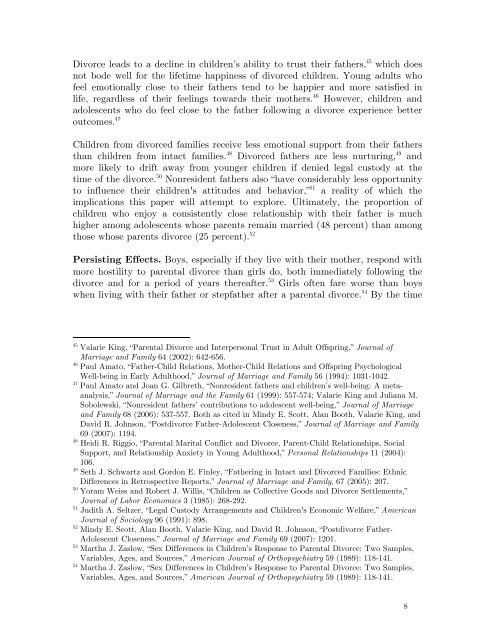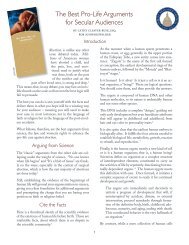The Effects of Divorce on Children - Family Research Council
The Effects of Divorce on Children - Family Research Council
The Effects of Divorce on Children - Family Research Council
Create successful ePaper yourself
Turn your PDF publications into a flip-book with our unique Google optimized e-Paper software.
<str<strong>on</strong>g>Divorce</str<strong>on</strong>g> leads to a decline in children’s ability to trust their fathers, 45 which does<br />
not bode well for the lifetime happiness <str<strong>on</strong>g>of</str<strong>on</strong>g> divorced children. Young adults who<br />
feel emoti<strong>on</strong>ally close to their fathers tend to be happier and more satisfied in<br />
life, regardless <str<strong>on</strong>g>of</str<strong>on</strong>g> their feelings towards their mothers. 46 However, children and<br />
adolescents who do feel close to the father following a divorce experience better<br />
outcomes. 47<br />
<strong>Children</strong> from divorced families receive less emoti<strong>on</strong>al support from their fathers<br />
than children from intact families. 48 <str<strong>on</strong>g>Divorce</str<strong>on</strong>g>d fathers are less nurturing, 49 and<br />
more likely to drift away from younger children if denied legal custody at the<br />
time <str<strong>on</strong>g>of</str<strong>on</strong>g> the divorce. 50 N<strong>on</strong>resident fathers also “have c<strong>on</strong>siderably less opportunity<br />
to influence their children's attitudes and behavior,” 51 a reality <str<strong>on</strong>g>of</str<strong>on</strong>g> which the<br />
implicati<strong>on</strong>s this paper will attempt to explore. Ultimately, the proporti<strong>on</strong> <str<strong>on</strong>g>of</str<strong>on</strong>g><br />
children who enjoy a c<strong>on</strong>sistently close relati<strong>on</strong>ship with their father is much<br />
higher am<strong>on</strong>g adolescents whose parents remain married (48 percent) than am<strong>on</strong>g<br />
those whose parents divorce (25 percent). 52<br />
Persisting <str<strong>on</strong>g>Effects</str<strong>on</strong>g>. Boys, especially if they live with their mother, resp<strong>on</strong>d with<br />
more hostility to parental divorce than girls do, both immediately following the<br />
divorce and for a period <str<strong>on</strong>g>of</str<strong>on</strong>g> years thereafter. 53 Girls <str<strong>on</strong>g>of</str<strong>on</strong>g>ten fare worse than boys<br />
when living with their father or stepfather after a parental divorce. 54 By the time<br />
45<br />
Valarie King, “Parental <str<strong>on</strong>g>Divorce</str<strong>on</strong>g> and Interpers<strong>on</strong>al Trust in Adult Offspring,” Journal <str<strong>on</strong>g>of</str<strong>on</strong>g><br />
Marriage and <strong>Family</strong> 64 (2002): 642-656.<br />
46<br />
Paul Amato, “Father-Child Relati<strong>on</strong>s, Mother-Child Relati<strong>on</strong>s and Offspring Psychological<br />
Well-being in Early Adulthood,” Journal <str<strong>on</strong>g>of</str<strong>on</strong>g> Marriage and <strong>Family</strong> 56 (1994): 1031-1042.<br />
47<br />
Paul Amato and Joan G. Gilbreth, “N<strong>on</strong>resident fathers and children’s well-being: A metaanalysis,”<br />
Journal <str<strong>on</strong>g>of</str<strong>on</strong>g> Marriage and the <strong>Family</strong> 61 (1999): 557-574; Valarie King and Juliana M.<br />
Sobolewski, “N<strong>on</strong>resident fathers’ c<strong>on</strong>tributi<strong>on</strong>s to adolescent well-being,” Journal <str<strong>on</strong>g>of</str<strong>on</strong>g> Marriage<br />
and <strong>Family</strong> 68 (2006): 537-557. Both as cited in Mindy E. Scott, Alan Booth, Valarie King, and<br />
David R. Johns<strong>on</strong>, “Postdivorce Father-Adolescent Closeness,” Journal <str<strong>on</strong>g>of</str<strong>on</strong>g> Marriage and <strong>Family</strong><br />
69 (2007): 1194.<br />
48<br />
Heidi R. Riggio, “Parental Marital C<strong>on</strong>flict and <str<strong>on</strong>g>Divorce</str<strong>on</strong>g>, Parent-Child Relati<strong>on</strong>ships, Social<br />
Support, and Relati<strong>on</strong>ship Anxiety in Young Adulthood,” Pers<strong>on</strong>al Relati<strong>on</strong>ships 11 (2004):<br />
106.<br />
49<br />
Seth J. Schwartz and Gord<strong>on</strong> E. Finley, “Fathering in Intact and <str<strong>on</strong>g>Divorce</str<strong>on</strong>g>d Families: Ethnic<br />
Differences in Retrospective Reports,” Journal <str<strong>on</strong>g>of</str<strong>on</strong>g> Marriage and <strong>Family</strong>, 67 (2005): 207.<br />
50<br />
Yoram Weiss and Robert J. Willis, “<strong>Children</strong> as Collective Goods and <str<strong>on</strong>g>Divorce</str<strong>on</strong>g> Settlements,”<br />
Journal <str<strong>on</strong>g>of</str<strong>on</strong>g> Labor Ec<strong>on</strong>omics 3 (1985): 268-292.<br />
51<br />
Judith A. Seltzer, “Legal Custody Arrangements and <strong>Children</strong>'s Ec<strong>on</strong>omic Welfare,” American<br />
Journal <str<strong>on</strong>g>of</str<strong>on</strong>g> Sociology 96 (1991): 898.<br />
52<br />
Mindy E. Scott, Alan Booth, Valarie King, and David R. Johns<strong>on</strong>, “Postdivorce Father-<br />
Adolescent Closeness,” Journal <str<strong>on</strong>g>of</str<strong>on</strong>g> Marriage and <strong>Family</strong> 69 (2007): 1201.<br />
53<br />
Martha J. Zaslow, “Sex Differences in <strong>Children</strong>’s Resp<strong>on</strong>se to Parental <str<strong>on</strong>g>Divorce</str<strong>on</strong>g>: Two Samples,<br />
Variables, Ages, and Sources,” American Journal <str<strong>on</strong>g>of</str<strong>on</strong>g> Orthopsychiatry 59 (1989): 118-141.<br />
54<br />
Martha J. Zaslow, “Sex Differences in <strong>Children</strong>’s Resp<strong>on</strong>se to Parental <str<strong>on</strong>g>Divorce</str<strong>on</strong>g>: Two Samples,<br />
Variables, Ages, and Sources,” American Journal <str<strong>on</strong>g>of</str<strong>on</strong>g> Orthopsychiatry 59 (1989): 118-141.<br />
8




